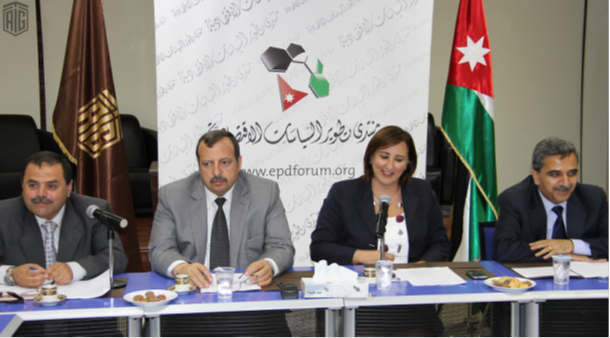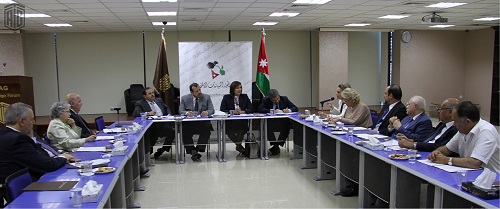Jordan Economic Observatory Tackles Jordan’s Agricultural Sector
AMMAN -------July 29, 2013------ The state of Jordan’s agricultural sector was put under the microscope in a seminar organized by the Jordan Economic Observatory at Talal Abu-Ghazaleh Knowledge Forum.
The high-level seminar was conducted by heads of the Observatory’s working groups Their Excellencies Dr. Mohammad Abu Hammour, Ms. Reem Badran and Adnan Abu Al Ragheb, as well as Head of the Jordanian Agricultural Engineers Association, Eng. Mahmoud Abu- Ghanimeh. They tackled the challenges facing this sector while highlighting the significant role it plays in food security and self-sufficiency.

Eng. Abu- Ghanimeh, who is also heading the agricultural working group at the Observatory, expressed his disappointment in the lack of attention and commitment given to the sector by successive governments.
The seminar featured several important ideas and suggestions which tackle the issues of desertification, climate change, investment, environmental impact from the establishment of projects, and tax law. It also proposed solutions for the current water crisis.
HE Dr. Talal Abu-Ghazaleh praised the quality of information shared and thanked attendees for their sterling work in the sector. He suggested that investment in the agriculture industry would encourage more development.
“These projects help provide opportunities for youth and contribute to the reduction of unemployment rates,” said HE Dr. Abu-Ghazaleh
Moreover, working groups called for the development of the agricultural working group report. In doing so this could incorporate detailed information and figures, and sharing its content with key stakeholders including associations, syndicates, civil society institutions, the Department of Income Tax, the Department of Statistics, Chambers of Commerce and Industry, Ministry of Agriculture and the Economic Policy Development Forum.
Previously, the agricultural working group presented recommendations to develop the agricultural sector, including:
- Work with the relevant parties to agree on the amount of water allocated for agriculture in the Jordan Valley and other high usage areas.
- Control and organize the foreign labor working in the agricultural sector, in addition to developing regulations and mechanisms.
- Form a permanent agricultural committee consisting of the private sector, Ministry of Agriculture and Ministry of Labor to implement and oversee recruitment in accordance with the Ministry of Agriculture’s instructions in determining the number of workers required for different agricultural areas.
- Deliver free electricity to the majority of agricultural areas, and simplify the procedures for farmers to receive this service.
- Update legislation for the development and improvement of the sector, mainly:
1. Chamber of Agriculture.
2. Align the National Center for Agricultural Research and Extension with the systems adopted by other country’s research centers.
In addition, the paper tackled the Jordan Farmers Union law and the establishment of qualitative unions, while requiring the following:
- Exempting agricultural products from general taxes imposed on sales.

- Encouraging agricultural marketing companies, such as private joint-stock companies, and providing loans to such institutions.
- Enabling local fertilizer factories to purchase raw materials from both the Arab Potash Company and Jordan Phosphate Mines Company at preferential prices, to production costs endured by farmers.
Notes to editors
The Jordan Economic Observatory operates under the umbrella of the Economic Policy Development Forum, and it is considered a permanent, ongoing, institutional project and a dependant neutral party whose job is to professionally monitor the governmental performance. The Observatory works in a transparent, open and collaborative manner with all parties, and includes experts whose goal is to study the economic policies using specific standards on a clear basis.
One of the Observatory’s main functions in the first stage is to prepare a document which clarifies the definition of economic policies, the standards and indications required by successive governments to use as a guide in the short and medium term periods. Following these indications, a control of the application of such standards needs to be made. Finally, to make these changes possible, the Observatory formed 19 work forces inclusive of all productive and economic sectors.